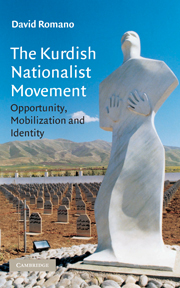Book contents
- Frontmatter
- Contents
- Acknowledgments
- List of acronyms and abbreviations
- Map
- 1 Making sense of ethnic nationalist resurgence
- 2 Structural conditions and political opportunities
- 3 Resource mobilization and rational choices
- 4 Cultural framing
- 5 Theoretical synthesis
- 6 Kurdish nationalist challenges to the Iraqi state
- 7 Kurdish nationalist challenges to the Iranian state
- 8 Conclusion
- Bibliography
- Index
- Cambridge Middle East Studies 22
2 - Structural conditions and political opportunities
Published online by Cambridge University Press: 14 January 2010
- Frontmatter
- Contents
- Acknowledgments
- List of acronyms and abbreviations
- Map
- 1 Making sense of ethnic nationalist resurgence
- 2 Structural conditions and political opportunities
- 3 Resource mobilization and rational choices
- 4 Cultural framing
- 5 Theoretical synthesis
- 6 Kurdish nationalist challenges to the Iraqi state
- 7 Kurdish nationalist challenges to the Iranian state
- 8 Conclusion
- Bibliography
- Index
- Cambridge Middle East Studies 22
Summary
This chapter focuses on the usefulness of a structural analysis in explaining Kurdish ethnic-nationalist opposition to the state in Turkey. In particular, I probe the explanatory power of the following five variables:
the relative openness or closure of the institutionalized political system;
the stability of that broad set of elite alignments that typically undergird a polity;
the presence of elite allies;
the state's capacity and propensity for repression; and
international and foreign influences supportive of the state or its opponents.
The first four of these variables are those that constitute McAdam, McCarthy, and Zald's notion of opportunity structures. The final variable (the international dimension) I judged simply too important to be left out. Understandably, there is a common tendency to include a long list of factors that constrain or encourage state opposition movements, but to make sense of such a complex phenomenon we must focus on a short list of variables and divide the subject into cognitively manageable chunks. The analysis presented here examines opportunity structures in different phases of Turkey's modern history, ending with the present.
Although there have been many outbreaks of subversive violence as well as specifically Kurdish rebellions in modern Turkey, there have been no cases of successful revolution or Kurdish revolts there. Hence it is not possible to even approach “proving” or “disproving” the importance of different approaches to the subject; rather, we can only hope to roughly evaluate the extent to which the opportunity structures concept contributes to a compelling explanation for the outbreak of ethnic nationalist rebellion in Turkey.
- Type
- Chapter
- Information
- The Kurdish Nationalist MovementOpportunity, Mobilization and Identity, pp. 25 - 66Publisher: Cambridge University PressPrint publication year: 2006



